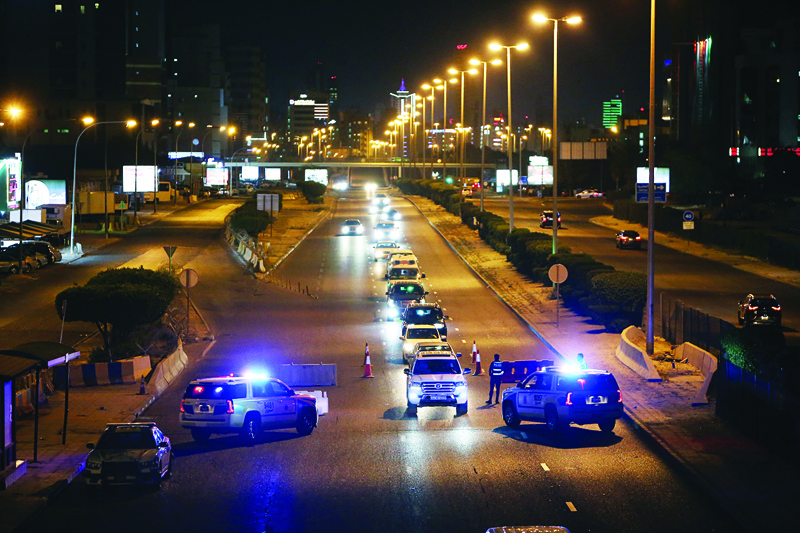 KUWAIT: Traffic policemen man a checkpoint at a highway during curfew hours in this March 15, 2021 file photo. - Photo by Yasser Al-Zayyat
KUWAIT: Traffic policemen man a checkpoint at a highway during curfew hours in this March 15, 2021 file photo. - Photo by Yasser Al-ZayyatKUWAIT: Kuwait police may use firearms to subdue individuals who exhibit violent behavior or attempt to resist arrest, the Interior Ministry said in new instructions made in the aftermath of the stab murder of a traffic policeman last week. The new instruction also stipulates that each patrol vehicle must have two officers when sent out on duty, and they must be armed at all times while on patrol.
According to the internal letter issued by Assistant Undersecretary for Public Security Maj Gen Faraj Al-Zaabi, directors general of security departments in governorates, directors of operations and patrol departments and area commanders shall inform the police force in case a patrol is sent out in response to calls or to implement operations and special service orders to send out patrols or to remain temporarily in certain places, to comply with the following:
First: Rules for the security patrol going out:
1. The patrol must be with two policemen, and it is not allowed to only have one individual.
2. Policemen on patrol must be equipped with all supplies including handcuffs, batons, firearms and ammunition.
3. Policemen on patrol must be vigilant and cautious, and should be strict with any action that may violate law and order.
4. Policemen on patrol must have good military leadership and treat the public well.
Second: Rules for using firearms:
Comply with instructions and special orders to use firearms mentioned in item (2) of ministerial decision 727/2019 as per the following situations:
1. To arrest a convicted individual in a felony case.
2. To arrest a suspect in a felony or misdemeanor case if they resist or try to escape.
3. To arrest a suspect who has an arrest warrant against them, if they resist or attempt to escape.
4. To arrest a prisoner who attempts to escape.
5. To break up gatherings of seven and more, held with the purpose of committing a crime or endangering individuals' lives and properties, in case the gathering does not disperse after being warned, and attempts to disperse them by other means fails.
6. In case of self-defense.
7. When dealing with hysterical individuals or those suffering from bouts of anger that may cause loss of self-control, self-harm or harm to others, be it in a public or private place.










